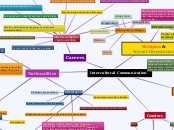The Controversy Behind, "Bewitched"
While some consider “Bewitched” to have reinforced social values, these articles lead us to believe the sitcom grew from past sitcoms and challenged gender roles by reversing the dominant figure from the husband to the wife, addressing the problems of repression, and relating to fragile social issues such as race and homosexuality in a subtle way.
Growth from previous sitcoms
Bewitched had a lot of similar aspects as I love Lucy did but it was a step up because it took many details from the previous sitcoms but many times went into more detail.
Bewitched began the change in gender which was different from the previous sitcoms. It changed the female to be the more dominant figure than the male, which in most other sitcoms the wife would be scared of the husband. In this case Samantha, being a witch, had power over Darrin making him afraid of her, which Asimov explains in, "Husbands, Beware!"
A quote by Asimov displaying how the roles reverse, “’Bewitched’ is destroying all that is most holy and wonderful in marriage-‘wifely terror’” (Asimov 1). Asimov very much disagrees with this idea of the woman being in power his reply to this change is, "One thing I am going to do at once is to keep my own wife in a state of wholesome terror." (Asimov, 10)
Relating to fragile social issues
Class Issues
middle-class assumptions about parenting are the correct ones for the raising of the boy, class pressures on the father be damned. (Met 86)
Samantha chooses to adopt Darrin's bourgeois lifestyle, aud thus live without magic or maid, is an ambiguous political act. On the one hand, she is subsuming her heritage in favor of her husband's; yet on the other hand, her decision to reject that heritage is a critique of Endora's and Maurice's smug aristocratic superiority, (Metz 85)
Other episodes reveal this class-bound smugness as a
feature of bourgeois culture itself, not just as the domain of
aristocrats (Metz 85)
Race
points to a progressive, nuanced engagement with the civil rights struggles of the 1960s, it would be a mistake to reduce the show to this one engagement racial politics. (Metz 80)
Bewitched often engages in the transparent practices of paternalistic, centrist racial politics. (Metz 80)
This paternalistic approach to liberal racial tolerance (black
characters are portrayed as impossibly perfect, and interracial relationships are "approved" by "forward-thinking" white folks) (Metz 81)
The witches fight against their pop ular image as ugly old crones, much as simultaneous NAACP protests against Amos 'n' Andy (CBS, 1951-53) for peddlillg stereotypes of black men as lazy and shiftless resulted in th" show being quietly removed from syndication by CBS. - Metz (79)
Addressing problems of repression
["The Legend of Lizzie" by Robert Pela]
-Lizzie not repressing herself as a witch
-Dick Sargent as Husband along with Lizzie's
public support
"Bewitched is sort of a gay allegory: the story of a different person in this case, a witch who's being told that she can't tell anyone who or what she really is. It's the ultimate closet story"
After hearing this quote from the Advocate, Lizzie admitted the set considered that thought.
"...a vast number of sitcoms - such as Bewitched, I Dream of Jeannie and Sex and the City - have alternate readings which recast characters as gay, or are seen to offer camp pleasures which are enjoyed by gay and lesbian viewers." (Mills 138)
Challenging gender roles
Betty Friedman's Femme Mystique challeneged gender roles. “She urged them to break away from their domestic confines, go back to school, pursue careers, and revive the vision of female independence that had been alive before World War II” women responded by agreeing that they have not fufilled their potentials. this caused the next generation to slightly stray from the domestic ideal and pursue careers. they strived to establish themselves outside of the home. sitcoms also changed women were given larger roles. In shows like "Bewitched" the main character is the a woman and the show is centered around her life.
A Time article stated, "Nobody is more noisily dissatisfied these days than that symbol of stability—the Fortyish housewife with teen-age children and a reasonably successful Husband." For those women the suburban revolution had been accomplished, and now they found that--in an age of laborsaving devices, affluence, and social fluidity--mere homemaking was not enough”









